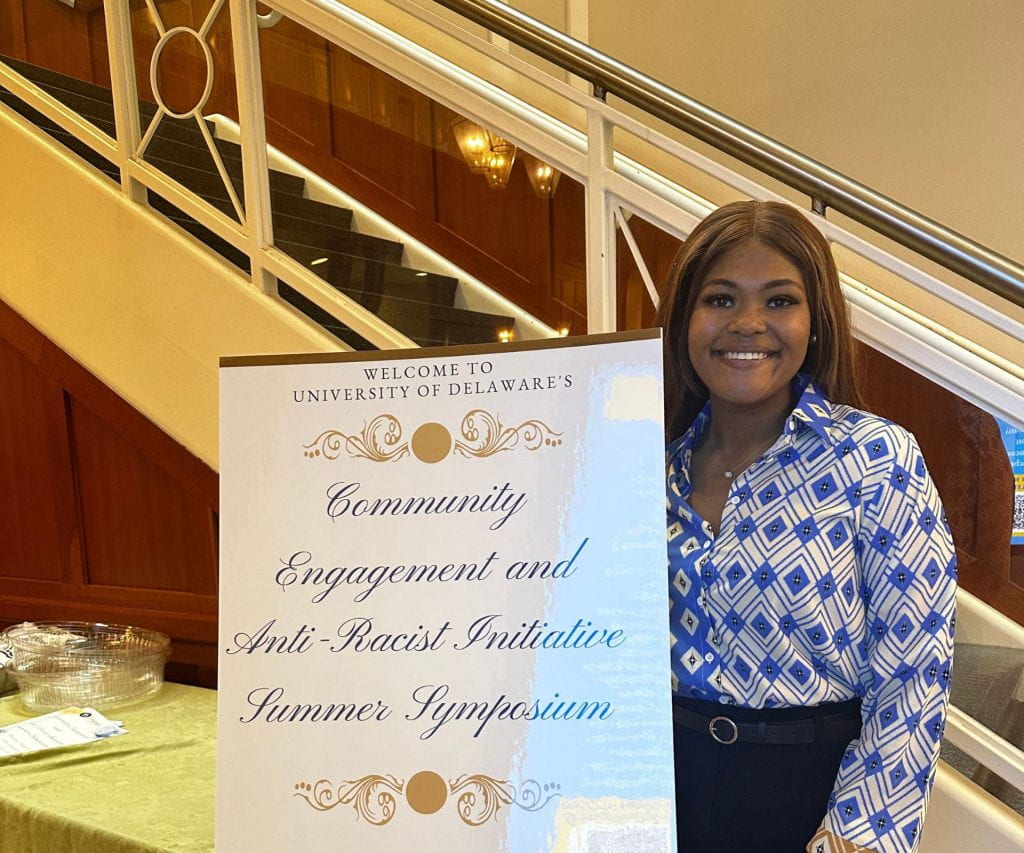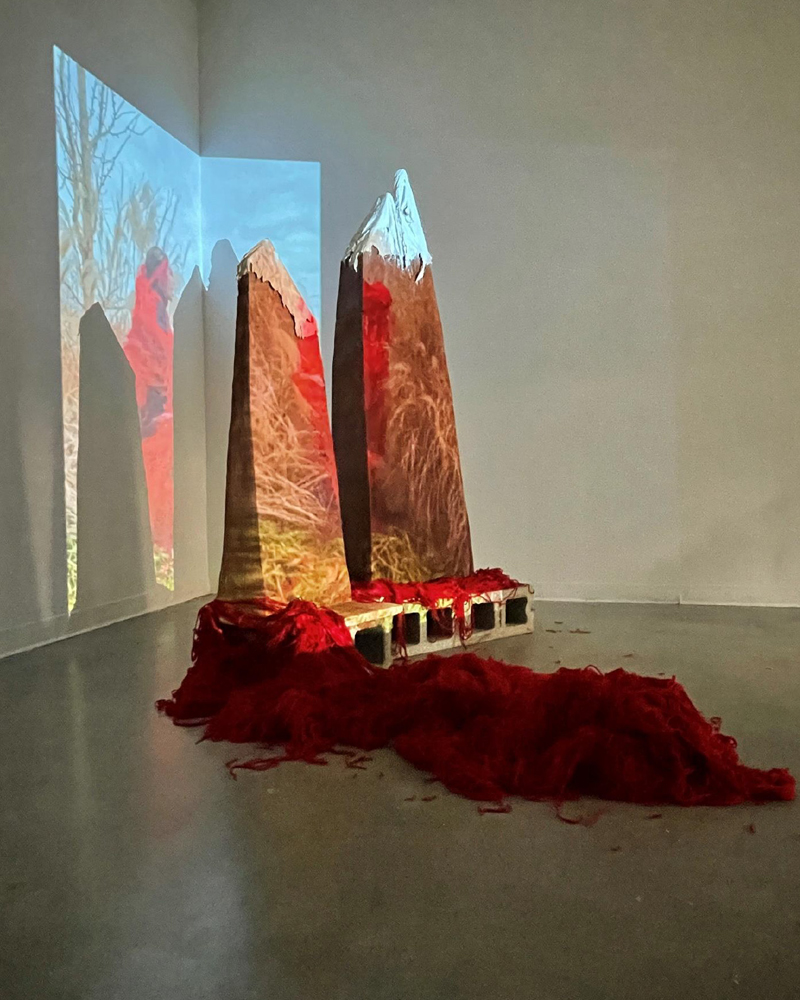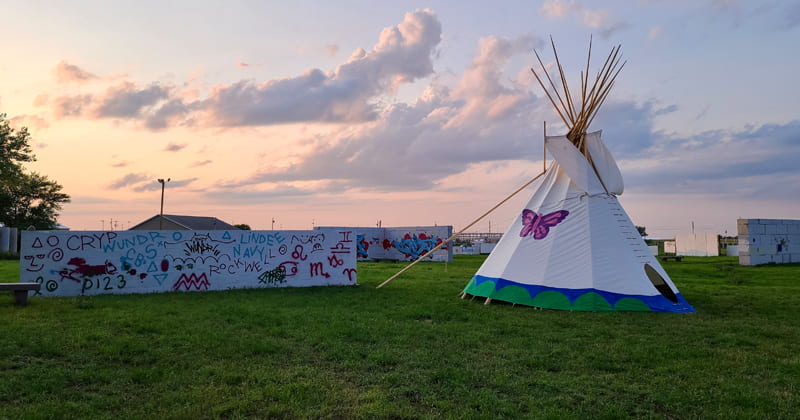Graduate students dive into summer community engagement

Last summer, Chelsia Douglas partnered with local nonprofit The Connect to analyze its data-collection methods to help advance its mission of retaining and developing young talent in Delaware, a project that tied to her studies as a doctoral student in the University of Delaware’s Joseph R. Biden, Jr. School of Public Policy and Administration.
Douglas also felt a strong personal connection to The Connect’s mission, so the Alabama native now plans to stay in the area with her young son when she completes her doctorate.
Her transformative experience is similar to those of other graduate students who have participated in summer programs offered through the Community Engagement Initiative (CEI) in the past few years.
The Graduate Community Engagement Summer Scholars and Graduate UD Anti-Racism Initiative Summer Scholars programs provide highly motivated graduate students the opportunity to immerse themselves in community-based or anti-racism projects. The programs were established by Lynette Overby, former CEI director, with funding from the Laffey-McHugh Foundation and UD’s Graduate College.
Scholars receive a stipend of $5,000 to spend 10 weeks in full-time pursuit of research or a creative project.

“Bear the Burden of Borders” is a mixed media artwork highlighting the plight of kolbars, Kurdish porters who risk their lives in the Zagros Mountains to carry sanctioned items into Iran.
Sahar Tarighi, master’s candidate in the Department of Art and Design, created two artworks over the summer of 2023 that explore universal themes of human rights, racism, borders and political boundaries.
Originally from Iranian Kurdistan, Tarighi wanted to bring attention to the plight of kolbars. These Kurdish porters traverse the Zagros Mountains between Iraq and Iran carrying items that are readily available on the Iraqi side of the border, such as appliances, but are sanctioned in Iran. The journey is treacherous and often results in injury or death for the kolbars.
“It’s all talking about land, power and authority figures, patriarchy and monarchy. Stuff that we are struggling with is just universal,” Taghiri said. She aims to serve her people through her art, “to bring more attention, to raise awareness, to amplify their voices.”
Dakota Stevens, a curatorial-track doctoral candidate in art history, also has a goal to raise awareness through engaged scholarship. Stevens’ dissertation is on indigenous-authored murals across North America.
In the course of his research, he identified the need for a searchable archive that maps murals created by indigenous artists.
“There’s not a ton of recognition of indigenous muralists,” Stevens said. “My practice is all about working with and engaging the communities.”
In 2022, the summer scholarship program enabled Stevens to create a proof of concept for the site, and he hopes to someday hire programmers to make the site a user-generated platform, allowing artists to submit their own biographies and interpretations of their work.

Dakota Stevens, a curatorial-track doctoral candidate in art history, hopes to raise awareness through engaged scholarship. His dissertation is on indigenous-authored murals across North America. Pictured are a tipi and painted walls in Waniyetu Wowapi Art Park, Eagle Butte, South Dakota. The walls were painted by artists and local youth from the Cheyenne River Sioux Tribe as part of the 9th Annual RedCan Graffiti Jam.
“It was fantastic for me, as a student in the humanities,” Stevens said. “An immunization awareness campaign … is a fairly easy, discernable level of community engagement. My engagement is much more with the artists and their direct communities.”
“The key to community engagement is not your field of study,” said Leann Moore, CEI’s associate director who oversees student programs. “It is a willingness to engage with community needs.”
Graduate students across disciplines are encouraged to apply for the Graduate Community Engagement Summer Scholars Program or the Graduate UD Anti-Racism Initiative Summer Scholars Program before Jan. 8, 2024. Decisions will be announced on Jan. 30. Questions about the programs can be directed to BlueHensEngage@udel.edu.
Originally published on UDaily on November 29, 2023. Article by Tabitha Groh. Photos courtesy of Chelsia Douglas, Sahar Tarighi and Dakota H. Stevens.
